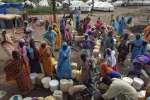UNHCR-WFP team finds dire health conditions in Algerian refugee camps
News Stories, 12 February 2007

GENEVA, February 13 (UNHCR) – UNHCR specialists have sounded alarm bells about dire health conditions in Algerian camps for Sahrawi refugees, including high levels of anaemia among pregnant and lactating women. They also stressed the need for urgent action to tackle acute malnutrition.
Their warnings came during debriefing sessions in Geneva on their January 23-February 5 food assessment mission with World Food Programme (WFP) experts to five camps in south-western Algeria. The specialists have also discussed their findings with donors.
The joint assessment team made several recommendations aimed at improving conditions in the camps. These included raising awareness about nutritional issues, water handling and hygiene; adding wheat soy blend to the general ration; and distinguishing between long-term malnutrition and acute malnutrition.
"One of the problems in the camp is that children suffering from acute malnutrition were not easily identified because they were mixed up with long-term malnutrition," explained senior desk officer Janak Upadhyay, who took part in the mission.
"Acute malnutrition – which can be identified from the wasting of the muscles – can be life threatening and needs to be immediately addressed. Longer-term malnutrition needs a different nutritional approach," he added.
The specialists also recommended more varied diets; supplementary nutrition for young children and pregnant and lactating mothers; and better cooperation and monitoring of food distribution. Interest has been shown by the donors on the ground to fund some of the proposed additional programmes.
The UNHCR and WFP team – accompanied by observers from the European Commission's humanitarian aid department (ECHO) and the Spanish Agency of International Cooperation – visited health centres and hospitals in the camps and assessed warehousing, distribution and monitoring mechanisms.
They paid informal visits on many Sahrawi families in the camps as well as holding formal talks with leaders of the refugees from Western Sahara. They also met officials of the Sahrawi Red Crescent and the Algerian government.
The refugees in the remote desert camps are particularly vulnerable because they are dependent on UN agencies and other humanitarian groups for all their food and non-food needs.
"Most of the refugees have been there for more than 30 years.... We met children in the camp who were born and raised there," said Upadhyay. "They are children who don't know any better than living in a desert – dependent on aid, part of a political problem without a solution in sight. It is very sad."
UNHCR and WFP assist the 90,000 most vulnerable refugees, with the support of donors and NGOs. But there are still shortages despite repeated calls for additional funding. This led to a temporary cut in food supplies at the end of last year. The food pipeline has been partially restored.
Sahrawi refugees began arriving in Algeria in the mid-1970s to escape conflict in Western Sahara after Spain withdrew from the region.
In recent years, UNHCR has facilitated family visits and contact between Sahrawi refugees in the Tindouf area of Algeria and relatives in Western Sahara. Only four weeks ago, UNHCR launched an appeal for an additional US$3.5 million to continue this assistance.
























































